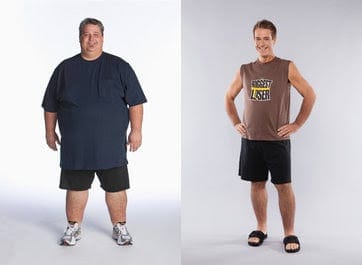
A number of articles have come out recently, discussing a study that was done with one season (Season 8) of the show “The Biggest Loser,” T.V.’s most extreme weight loss show. If you haven’t watched it, they take people who are morbidly obese and put them on a very low calorie diet, make them work out many hours a day at the “ranch,” and then have them compete to see who can lose the highest percentage of their body weight.
Kevin Hall, a scientist at a federal research center, had the idea to follow the “Biggest Loser” contestants for six years after the season finale. The project was the first to measure what happened to people over as long as six years after they had lost large amounts of weight with intensive dieting and exercise.
We already know that after dieting, a person’s resting metabolic rate is lower. It’s lower for two reasons—first, the lower body weight comes automatically with lower metabolism, and second, when you lose weight, your body tries to protect it’s fat stores by lowering your rate of burning calories.
But this study came up with eyebrow raising proof of just how hard the body fights back against weight loss. What was so surprising was that the contestants did not recover a normal metabolism for their weight, even years afterward!
See the original article here: “After ‘The Biggest Loser,’ Their Bodies Fought to Regain Weight”

BEFORE and AT FINALE Credit Left: Chris Haston/NBC Universal via Getty; Right: Trae Patton/NBC Universal, via Getty
“I won’t be victim to this. It’s the hand I’ve been dealt.” Danny Cahill, 46, speaker, author, land surveyor and musician, Broken Arrow, Okla.
WEIGHT Before show, 430 pounds; at finale, 191 pounds; now, 295 pounds
METABOLIC RATE Now burns 800 fewer calories a day than would be expected for a man his size.
So, how does that apply to us? What can we learn from this new information? First, let me say that this was a study with only 16 participants, so there is more research to be done. But if this is the case for the extreme and unsustainable program, what happens when there is a realistic diet and exercise program?
From my own experience (I’ve kept off about 140lbs for over 18 years) it comes down to commitment. And I would say that no matter how much exercise I do, I will always have to watch my diet. But that’s the rub: this isn’t something you do for a short term, and then you go back to your original eating and exercise habits.
You have to commit to a new lifestyle—one that’s healthier and permanent. You are going to run into a bit of an ongoing struggle. You will fight hormones and your own biologic imperative. You aren’t going to be like your “skinny” friends and be able to eat french fries and iced cream all the time to your hearts’ content. But you weren’t getting away with it before, either, were you?
So in the end, incorporating healthy lifestyle changes that are sustainable for you will be your best chance of weight loss success, and maintenance. If you want to lose weight, your options are to lose it and work hard to maintain it, or stay where you are.
I choose to keep fighting, just like Danny.
Get Started! Tell us about your goals!
Written by Melissa Abramovich, ACE CPT, NASM CGT, AAHFRP Medical Exercise Specialist at Elite Sports Club-River Glen
Melissa Abramovich went into Personal Training and Group Exercise instruction after successfully losing 140 pounds through healthy diet and exercise. Her desire to help others drove her forward into a career helping others to make healthier choices. She is an ACE certified personal trainer and now also a Medical Exercise Specialist (AAHFRP), helping clients with a myriad of health issues at Elite Sports Clubs. She holds a Bachelor’s degree, and many group exercise related certifications as well.